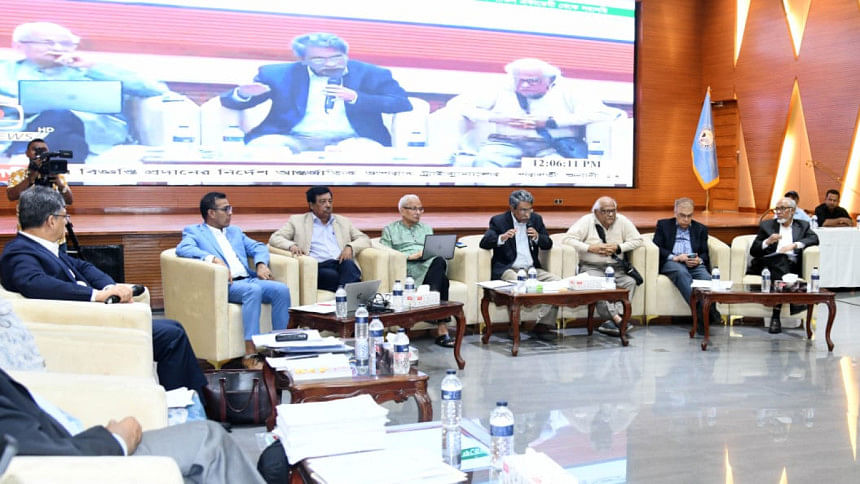Seating spat, tense exchanges: Consensus commission's reform talks enter 2nd phase

The beginning of the second phase of the National Consensus Commission's reform dialogue was marred by a few tensed exchanges, ranging from disagreement over seating arrangements to structural disagreements over how reforms should be implemented.
The first sign of tension came early when the leader of a political party objected to his assigned seat.
"I want to know how the seating was fixed," he asked a commission member, visibly frustrated at being placed behind others.
"I want to know how many hours they spent on the streets, what their contributions were."
The issue was quietly resolved, but it set the tone for a day marred by frequent flare-ups.
Another visible sign of discord was the empty seat next to BNP's Salahuddin Ahmed, meant for a representative from Jamaat-e-Islami.
A member of the consensus commission told The Daily Star that the party informed them beforehand that they might not join, reportedly over being "ignored" in decisions regarding the timing of the election, after a joint statement by the interim government and BNP following a meeting in London.
As the day progressed, the situation got intense after NCP's Senior Joint Convenor Ariful Islam Adib was interrupted by other political party leaders when he stood up to question the inclusivity of the process.
"Where are the martyrs and the injured? Were students, civil society, or professional groups consulted?" he asked.
"All the mandate does not belong to political parties alone," he added.
The exchange sparked a shouting match, briefly derailing the session until commission head Ali Riaz intervened.
Substantive disagreements surfaced over proposed amendments to Article 70.
While all parties agreed to relax the provision currently banning MPs from voting against their party, some, later backed by the BNP, pushed to keep party-line restrictions intact for votes on national security and constitutional amendments.
This was strongly opposed by the NCP, which argued such carve-outs would dilute the reform's intent.
Women's representation in parliament proved to be another contentious issue. While most parties backed raising the number of reserved seats from 50 to 100, some Islamic parties claimed it would betray the spirit of the uprising by reinforcing the quota system.
Even among backers, there was no agreement on how the seats should be filled: NCP argued for direct elections, while others wanted to maintain party-based nominations.
There was also friction over the opposition's role in parliamentary standing committees. Though a minimum of four chair positions was agreed upon, debate raged over which ministries they would cover.
The commission proposed a flexible formula: up to 24 chairs depending on the opposition's seat share, but parties disagreed on priorities, with some pushing for Home and Finance, others for Law and Education.
Adib, during a press briefing, also criticised the commission's neutrality. Although six different methods for implementing reforms were supposed to be discussed, including referendum and constituent assembly, he noted that Commission Chair Prof Muhammad Yunus had already ruled out the referendum option and voiced support for passing reforms via parliament.
"Choosing a method before it's even discussed undermines the process," Adib said.
He said that the 2024 mass uprising had three key stakeholders: political parties, the general public, and students.
"But the current dialogue only involves political parties," he said. "The uprising was not the result of political efforts alone – it was driven by citizens and professionals who now have no representation at the table."
The NCP leader also expressed suspicion that some parties may have been invited to the talks on the recommendation of a major political force.
"We're concerned that discussions are being shaped to serve one party's narrative," he said, adding that many parties simply echo that party's stance or reject it without offering substantive input.
"Whenever an alternative view is voiced, it's met with disruption rather than debate," he added.
Meanwhile, Gono Odhikar Parishad's Nurul Haque Nur raised concerns over the election environment.
"If someone like me has to be held hostage, what kind of election can we expect?" he asked. "Before anything else, we need a level playing field."
As dialogue resumes tomorrow, the path to consensus appears far from smooth.

 For all latest news, follow The Daily Star's Google News channel.
For all latest news, follow The Daily Star's Google News channel. 









Comments